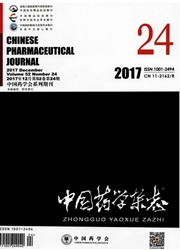

 中文摘要:
中文摘要:
目的研究不同季铵化度(DQ)对三甲基壳聚糖(TMC)载胰岛素纳米粒性质及细胞摄取、跨膜转运的影响,并考察黏液对其作用,为口服纳米粒研究提供参考。方法采用离子交联法制备不同季铵化度三甲基壳聚糖纳米粒,以黏液分泌型HT29-MTX.E12(E12)细胞为模型研究在有无黏液存在的情况下纳米粒的细胞摄取与转运情况。结果季铵化度越高,三甲基壳聚糖纳米粒稳定性、细胞摄取及跨膜转运率越高,并且黏液对高季铵化度的三甲基壳聚糖纳米粒表现出阻碍作用,对低季铵化度的三甲基壳聚糖纳米粒表现为一定的促进作用。结论季铵化度是影响三甲基壳聚糖纳米粒性质的关键因素,在设计口服纳米粒时要综合考虑其穿黏液性质和跨肠上皮细胞的能力。
 英文摘要:
英文摘要:
OBJECTIVE To study the effects of degree of quaternization (DQ) and mueus on cellular uptake and transport of tri- methyl chitosan (TMC) nanoparticles. METHODS Ionotropic gelation method was adopted to prepare TMC nanoparticles, and mu- cus-secreting HT29-MTX-E12 (El2) cell monolayer was chosen as a cell model to investigate the cellular uptake and transport of TMC nanoparticles with or without mucus. RESULTS The efficiency of cellular uptake and transport as well as the stability of TMC nanop- articles were enhanced with DQ increasing. Mucus acted as a barrier to TMC nanoparticles with higher DQ while as an enhancer to TMC nanoparticles with lower DQ. CONCLUSION DQ is a key factor to impact properties of TMC nanoparticles. Both mucus pene- trating ability and gut epithelium permeation should be considered.
 同期刊论文项目
同期刊论文项目
 同项目期刊论文
同项目期刊论文
 Preparation and characterization of novel multi-core chitosan microspheres for stomach-specific deli
Preparation and characterization of novel multi-core chitosan microspheres for stomach-specific deli Orally delivered salmon calcitonin-loaded solid lipid nanoparticles prepared by micelle–double emuls
Orally delivered salmon calcitonin-loaded solid lipid nanoparticles prepared by micelle–double emuls Effects of degree of quaternization on the preparation and characterization of insulin-loaded trimet
Effects of degree of quaternization on the preparation and characterization of insulin-loaded trimet Enhanced stability of oralinsulin in targeted peptide ligand trimethyl chitosan nanoparticles agains
Enhanced stability of oralinsulin in targeted peptide ligand trimethyl chitosan nanoparticles agains Overcomingthe Diffusion Barrier of Mucus and Absorption Barrier of Epithelium bySelf-Assembled Nanop
Overcomingthe Diffusion Barrier of Mucus and Absorption Barrier of Epithelium bySelf-Assembled Nanop Efficient mucus permeationand tight junction opening by dissociable “mucus-inert” agents coated trim
Efficient mucus permeationand tight junction opening by dissociable “mucus-inert” agents coated trim Mechanism Study of Cellular Uptake and Tight Junction Opening Mediated by Goblet Cell-Specific Trime
Mechanism Study of Cellular Uptake and Tight Junction Opening Mediated by Goblet Cell-Specific Trime Design and evaluation of solid lipid nanoparticles modified with peptide ligand for oral delivery of
Design and evaluation of solid lipid nanoparticles modified with peptide ligand for oral delivery of Penetration derivative-based nanocomplexes for insulin oral delivery: enhanced mucosal permeation an
Penetration derivative-based nanocomplexes for insulin oral delivery: enhanced mucosal permeation an Orally delivered salmon calcitonin-loaded solid lipid nanoparticles prepared by micelle-double emuls
Orally delivered salmon calcitonin-loaded solid lipid nanoparticles prepared by micelle-double emuls Mechanism study of cellular uptake and tight junctions opening mediated by goblet cell-specific trim
Mechanism study of cellular uptake and tight junctions opening mediated by goblet cell-specific trim Exendin-4 Loaded Nanoparticles with a LipidShell and Aqueous Core Containing Micelles for Enhanced I
Exendin-4 Loaded Nanoparticles with a LipidShell and Aqueous Core Containing Micelles for Enhanced I Polymeric NanoparticlesAmenable to Simultaneous Installation of Exterior Targeting and InteriorThera
Polymeric NanoparticlesAmenable to Simultaneous Installation of Exterior Targeting and InteriorThera 期刊信息
期刊信息
